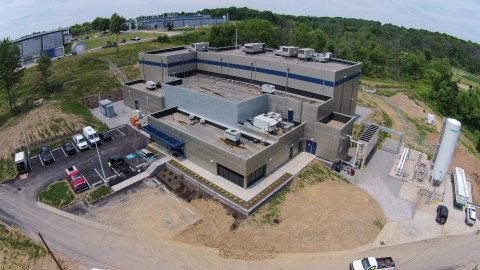Alcoa has opened their own state-of-the-art, 3D printing metal powder production facility. Located at the Alcoa Technology Center, one of the world’s largest light metals research centers, the company will produce proprietary titanium, nickel and aluminum powders optimized for 3D printed aerospace parts. Alcoa has also invested in a range of technologies to further develop additive processes, product design and qualification.
“Alcoa is forging a leadership path in additive manufacturing with a sharp focus on the critical input material—metal powders,” said Alcoa Chairman and Chief Executive Officer Klaus Kleinfeld. “We are combining our expertise in metallurgy, manufacturing, design and product qualification to push beyond the possibilities of today’s 3D printing technologies for aerospace and other growth markets.”
Metal powders used for 3D printing durable, high-quality aerospace parts are available in limited quantities. Through this expansion, announced in September 2015, Alcoa will develop materials with the specific properties needed to 3D print high-performance components. Alcoa has a lot of expertise in metal alloy development, having invented most of the aluminum alloys used in aerospace today. Additionally, it has a 100-year history in aluminum metal powder production, primarily for rocket fuel, paint and other products.
The facility will become part of Arconic following separation from Alcoa’s traditional commodity business in the second half of 2016. The plant is part of a $60 million investment in advanced 3D printing materials and processes that builds on the Company’s 3D printing capabilities in California, Georgia, Michigan, Pennsylvania and Texas.
In addition to producing powders, Alcoa focuses on advancing a range of additive techniques, including its recently unveiled Ampliforge™ process. This is a hybrid technique which combines additive and traditional manufacturing. By using the Ampliforge™ process, Alcoa designs and 3D prints a near complete part, then treats it using a traditional manufacturing process, such as forging. The process enhances the properties of 3D printed parts, increasing toughness and strength in comparison to parts made solely by additive manufacturing, and significantly reduces the material input. Alcoa is piloting the technique in Pittsburgh and Cleveland.
Alcoa has manufactured 3D printed products for the past 20 years and owns and operates one of the world’s largest Hot Isostatic Pressing (HIP) complexes in aerospace. HIP technology strengthens the metallic structures of traditional and additive manufactured parts made of titanium and nickel based super-alloys. Through the acquisition of RTI , Alcoa has gained 3D printing capabilities in titanium and other speciality metals for the aerospace market and other growth industries.
Demonstrating its leadership in additive manufacturing, Airbus recently selected Alcoa to supply 3D printed titanium fuselage and engine pylon parts for commercial aircraft. Alcoa expects to deliver the additive manufactured parts under the agreement later this year.
Alcoa Aerospace
Alcoa’s aerospace businesses will be a key component of Arconic following Alcoa’s separation. Arconic will be a premier innovator of high performance multi-material products and solutions in attractive growth markets, including aerospace. The separation remains subject to the satisfaction of certain conditions, including obtaining final approval from the Alcoa Board of Directors, receipt of a favorable IRS ruling and opinions of Alcoa’s tax advisors regarding certain U.S. federal income tax matters and the effectiveness of the Form 10.
About Alcoa
A global leader in lightweight metals technology, engineering and manufacturing, Alcoa innovates multi-material solutions that advance the world. Their technologies enhance transportation, from automotive and commercial transport to air and space travel, and improve industrial and consumer electronics products. They enable smart buildings, sustainable food and beverage packaging, high-performance defense vehicles across air, land and sea, deeper oil and gas drilling and more efficient power generation. They have been said to have pioneered the aluminum industry over 125 years ago, and today, more than 58,000 people in 30 countries deliver value-add products made of titanium, nickel and aluminum, and produce best-in-class bauxite, alumina and primary aluminum products.




